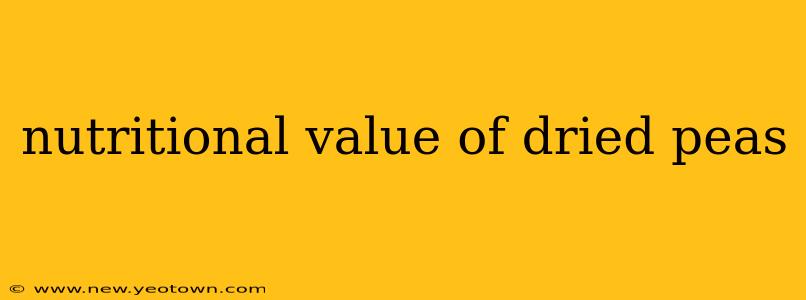Dried peas, those humble, unassuming legumes, are far more than just a side dish. They're nutritional powerhouses, packed with essential vitamins, minerals, and fiber, offering a surprising array of health benefits. Let's delve into the fascinating world of dried peas and explore why they deserve a prominent place in your diet.
My journey into the world of nutrition began with a simple question: what's the real deal with dried peas? I was surprised by what I discovered! They are not only incredibly affordable and versatile but also boast an impressive nutritional profile. This exploration goes beyond simple nutritional facts; it's a story about uncovering the hidden potential within a common ingredient.
What are the health benefits of dried peas?
The health benefits of dried peas are numerous and significant. Their high fiber content aids digestion, promoting regularity and preventing constipation. This fiber also contributes to feelings of fullness, making them a great addition to a weight-management diet. Beyond fiber, they are an excellent source of plant-based protein, crucial for building and repairing tissues. This protein, coupled with their rich iron content, makes them particularly beneficial for vegetarians and vegans.
Are dried peas good for weight loss?
The high fiber content in dried peas is indeed a significant factor in their potential for aiding weight loss. Fiber expands in the stomach, creating a feeling of satiety that can curb cravings and reduce overall calorie intake. Furthermore, the protein in dried peas helps regulate blood sugar levels, preventing energy crashes and reducing the likelihood of overeating later in the day. However, it’s crucial to remember that weight loss is a multifaceted process involving diet and exercise, and dried peas are just one component of a healthy weight-management strategy.
How many calories are in dried peas?
A one-cup serving of cooked dried peas typically contains around 230 calories. This calorie count is relatively low compared to many other protein sources, making them a sensible choice for those watching their calorie intake. However, the calorie count can vary depending on the preparation method (added fats or oils) and the specific type of pea.
What are the nutritional values of dried peas?
Dried peas are a treasure trove of essential nutrients. They're an excellent source of:
- Protein: Essential for building and repairing tissues.
- Fiber: Promotes healthy digestion and helps regulate blood sugar levels.
- Iron: Crucial for red blood cell production and oxygen transport.
- Folate: Important for cell growth and development.
- Potassium: Helps regulate blood pressure.
- Magnesium: Plays a vital role in many bodily functions, including muscle and nerve function.
- Vitamin K: Essential for blood clotting and bone health.
- Vitamin B6: Supports brain development and function.
How to prepare dried peas?
Preparing dried peas is a straightforward process. They need to be soaked overnight (or for at least 6 hours) before cooking. This soaking process significantly reduces cooking time and improves digestibility. After soaking, they can be simmered in water or broth until tender, typically for about an hour. The possibilities for incorporating them into meals are endless – from soups and stews to salads and side dishes, their versatility makes them a kitchen staple.
Conclusion: Embrace the Humble Pea
Dried peas are a nutritional powerhouse often overlooked. Their affordability, versatility, and impressive nutrient profile make them a fantastic addition to any healthy diet. Whether you're aiming for weight management, boosting your protein intake, or simply seeking a delicious and nutritious meal, dried peas deserve a place on your plate. So next time you're planning your meals, remember the mighty pea and unlock its hidden nutritional potential!

